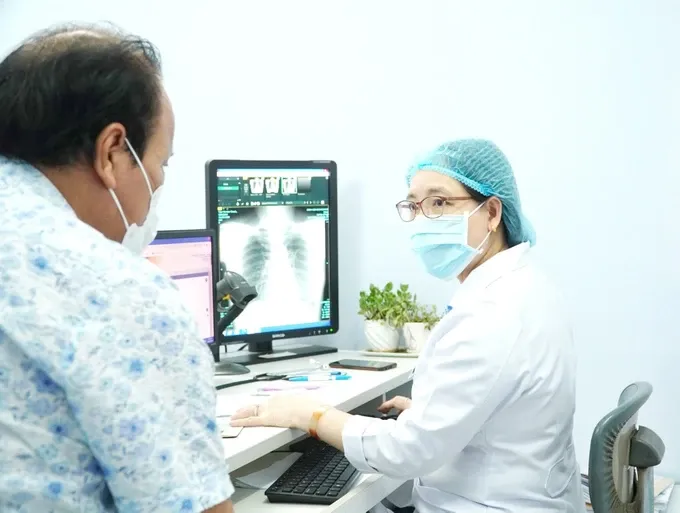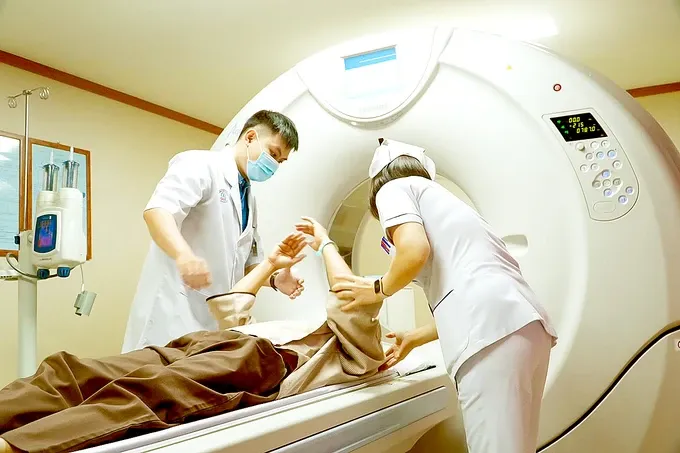
Promptly following the Ministry of Health’s promulgation of Circular 01/2025/TT-BYT (Circular 01), Cho Ray Hospital in HCMC issued procedural guidelines for patient transfers, outlining the designated diseases, disease groups, and instances of rare and critical illnesses eligible for 100-percent health insurance coverage of treatment expenses.
Pham Thanh Viet, Level-II Specialist, Deputy Director of Cho Ray Hospital, explained that the new regulations empower patients diagnosed at lower-level facilities with any of the 62 conditions listed in Circular 01 to seek treatment at Cho Ray Hospital or other specialist centers without requiring a formal referral.
“Analogous to the admission of emergency patients, those with any of the 62 listed conditions will receive full health insurance benefits without needing a referral. However, it is crucial for patients to understand that this new provision applies exclusively to the 62 listed conditions. Patients with other conditions must still adhere to established procedures to ensure health insurance coverage.”
Deputy Director Pham Thanh Viet of Cho Ray Hospital
At HCMC Oncology Hospital, of the 62 disease groups now exempt from referral requirements, the hospital routinely treats nine cancer types. The hospital is committed to facilitating seamless access to health insurance benefits for all patients; even those receiving a preliminary diagnosis of a condition not requiring a referral will be entitled to full coverage.
Similarly, K Hospital in Hanoi has implemented regulations effective from January 1, 2025, allowing patients with malignant tumors and in-situ neoplasms to utilize a medical examination and treatment transfer referral valid for one year. Patients who received cancer-related referrals in 2024 will continue to receive health insurance coverage for a full year from the date of issuance.
Director Le Van Quang of K Hospital noted that following the enactment of the revised Health Insurance Law and the issuance of Circular 01 by the Ministry of Health, 20,000 health insurance beneficiaries currently receiving treatment at the hospital will no longer be required to obtain annual referrals. This constitutes a significant improvement for patients, streamlining previously cumbersome administrative procedures.

According to Deputy Minister of Health Tran Van Thuan, by the end of 2024, health insurance coverage had been projected to encompass approximately 94 percent of the population, with over 180 million insured medical consultations and estimated expenditures of approximately VND142 trillion (US$5.58 billion).
In other words, Circular 01 plays a pivotal role in elevating the quality of over 13,000 health insurance-funded healthcare services nationwide and aligning them with the revised provisions of the Law on Medical Examination and Treatment as well as the amended Health Insurance Law. This is expected to establish a cohesive legal framework for the effective implementation of health insurance policies.
Further clarifying the scope of Circular 01, Director Tran Thi Trang of the Health Insurance Department (under the Ministry of Health) highlighted that the circular, for the first time, provides for 100-percent coverage, within the defined scope and patient entitlements, for numerous rare, critical, or surgical conditions, enabling patients to access specialist care directly without requiring a referral.
This includes 62 rare and critical diseases and disease groups eligible for treatment at specialist facilities; 167 diseases and disease groups eligible for treatment at primary care facilities; and 141 diseases and disease groups eligible for transfer to other facilities within one year of referral issuance.
This provision is designed to enhance access to timely and appropriate treatment for patients with conditions requiring specialist expertise not available at primary care facilities, thereby mitigating out-of-pocket healthcare expenses for households and promoting the efficient utilization of health insurance funds.
In addition, Circular 01 stipulates the use of both paper and electronic formats for follow-up appointment slips and transfer referrals, with electronic versions being piloted for integration into the Ministry of Public Security’s national e-identification application (VNeID).
“The implementation of electronic health insurance transfer referrals and follow-up appointment slips will enhance transparency in the transfer process, simplify administrative procedures, reduce processing times, and provide greater convenience for both patients and healthcare providers,” Director Tran Thi Trang affirmed.
Strengthening primary healthcare capacity
According to Assoc Prof Tang Chi Thuong, MD PhD, Director of the HCMC Department of Health, the city’s health sector has implemented numerous initiatives, including strengthening grassroots healthcare capacity to alleviate pressure on higher-level facilities and build public confidence.
District-level hospitals are continuously adopting new techniques, enhancing consultations with higher-level specialists, and procuring modern medical equipment to meet patient needs.
Furthermore, top-tier hospitals have provided specialist support to bolster the capabilities of lower-tier facilities, expanding comprehensive cooperation agreements with provincial and municipal health departments in the Southeast, Mekong Delta, Central Coast, and Central Highlands regions to enhance professional exchange and share best practices, with the ultimate goal of reducing the burden on city hospitals and improving the quality of healthcare provision across the region.
























